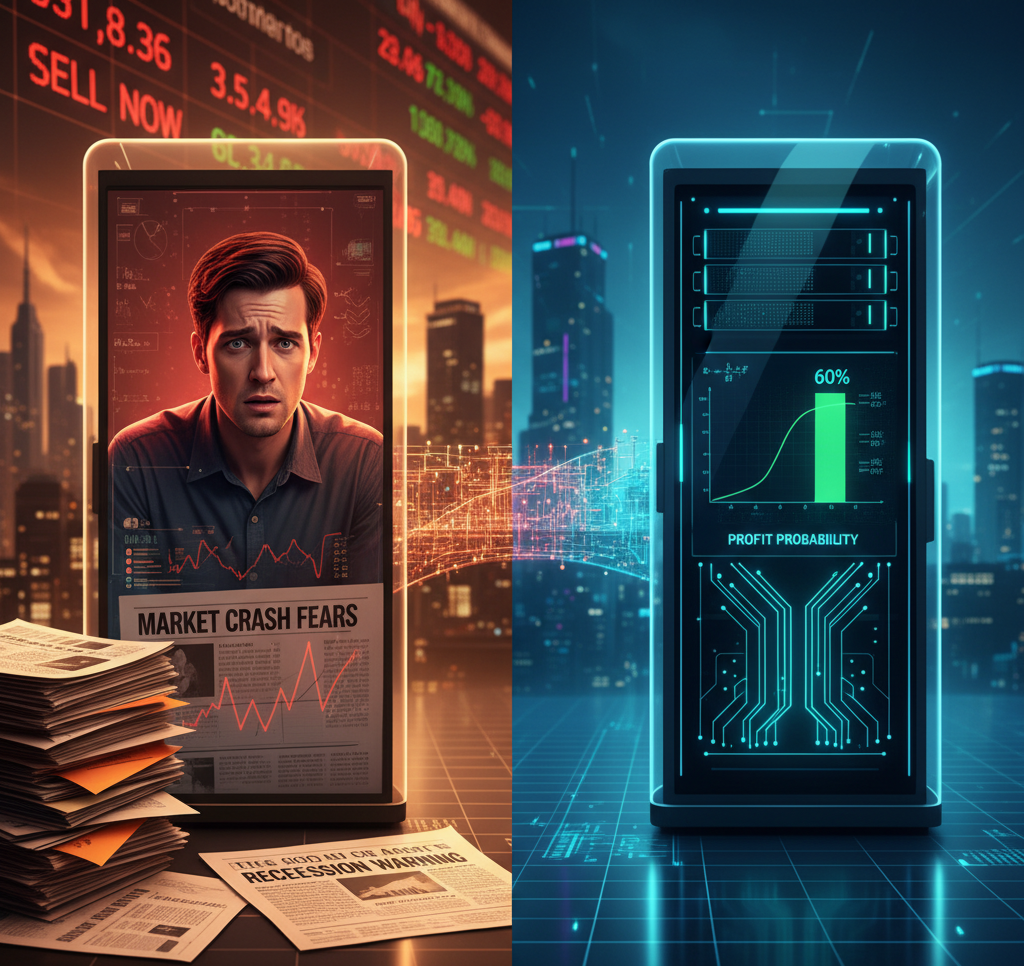The financial markets are humanity's largest casino, but most players are playing with a massive disadvantage: their own minds. While human traders battle emotions, cognitive biases, and evolutionary programming that worked for survival on the savannah but fails spectacularly in modern markets, AI operates with a fundamentally different cognitive architecture—one perfectly suited for the probabilistic nature of trading.
The Human Trading Paradox
Human traders face an impossible challenge. Our brains evolved for immediate survival decisions, not for evaluating complex financial probabilities over extended time horizons. When faced with potential losses, our amygdala triggers fight-or-flight responses that are counterproductive to rational investment decisions.
Consider loss aversion, perhaps the most destructive bias in trading. Behavioral economists have proven that humans feel the pain of a $1,000 loss approximately twice as intensely as the pleasure of a $1,000 gain. This asymmetry causes traders to:
- Hold losing positions too long, hoping for recovery
- Sell winning positions too early to "lock in" gains
- Avoid high-probability trades due to fear of potential losses
- Make increasingly desperate bets to recover from losses
AI's Cognitive Purity
Artificial intelligence operates without these evolutionary handicaps. When an AI evaluates a trading opportunity, it processes pure probability distributions without emotional interference. A 60% probability of profit is simply that—a mathematical relationship, not a source of anxiety or excitement.
This cognitive purity manifests in several key advantages:
Risk Neutrality: AI evaluates each trade based solely on expected value calculations, uninfluenced by previous wins or losses.
Temporal Consistency: Unlike humans who discount future rewards heavily, AI maintains consistent time preferences across all investment horizons.
Pattern Recognition Without Bias: AI identifies market patterns based on statistical significance rather than wishful thinking or fear-based pattern matching.
Emotional Immunity: Market volatility that sends human traders into panic or euphoria registers as mere data points for AI systems.
The Paradox of Market Efficiency
Traditional financial theory suggests that markets are efficient—that all available information is already reflected in prices. Yet this efficiency assumes rational actors, and humans are demonstrably irrational when it comes to financial decisions. AI creates a fascinating paradox: as more AI systems enter trading, markets may actually become more efficient, which could reduce the very inefficiencies that AI exploits.
This creates a temporary window of opportunity. Early AI adopters can capitalize on persistent human biases before the market becomes saturated with rational actors. It's a race between AI deployment and market efficiency.
Beyond Simple Automation
Modern AI trading systems go far beyond simple rule-based automation. They adapt to changing market conditions, identify emerging patterns, and even develop novel trading strategies that human traders might never consider. Machine learning algorithms can process vast datasets to identify subtle correlations that would be impossible for humans to detect.
These systems can simultaneously monitor thousands of assets, execute complex multi-leg strategies, and rebalance portfolios in milliseconds—all while maintaining perfect emotional discipline.
The Human Element Remains
Despite AI's cognitive advantages, successful AI trading systems still require human insight for strategy development, risk management oversight, and adaptation to unprecedented market conditions. The most successful approach combines AI's computational power with human creativity and intuition.
AI excels at execution and pattern recognition, but humans remain superior at understanding market context, regulatory changes, and the broader economic narratives that drive long-term trends.
The Future of Intelligent Trading
As AI systems become more sophisticated, we're moving toward a future where the most successful traders will be those who can effectively collaborate with AI, leveraging its cognitive advantages while providing the strategic direction and contextual understanding that only humans can offer.
At Weinvest, we're building this future today. Our multi-agent AI trading platform combines the best of both worlds: AI's emotional discipline and computational power with human strategic oversight and market intuition. The result is a trading approach that's both more rational and more adaptable than either humans or AI could achieve alone.
The question isn't whether AI will transform trading—it already has. The question is whether you'll adapt to this new reality or remain trapped by the cognitive limitations that evolution gave us.
Experience the future of AI-powered trading with Weinvest's multi-agent platform. Start your journey toward more rational, profitable investing today.
